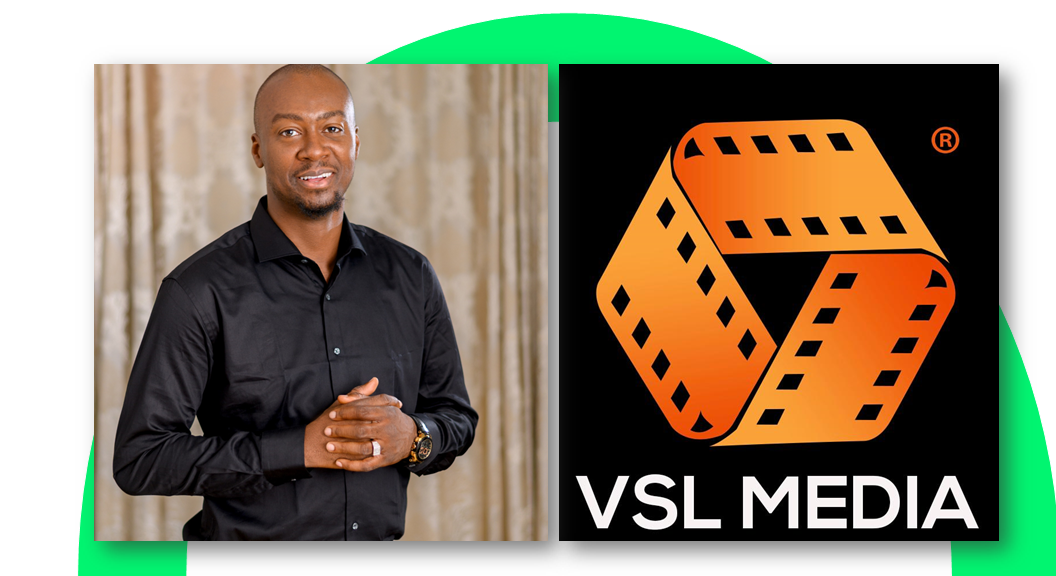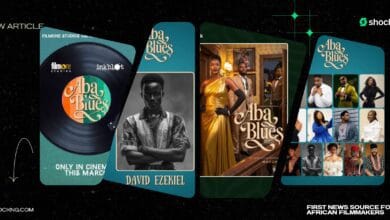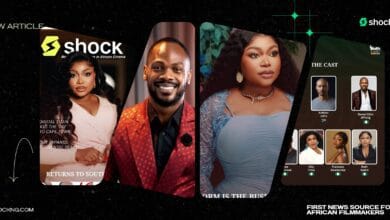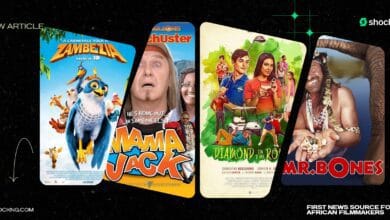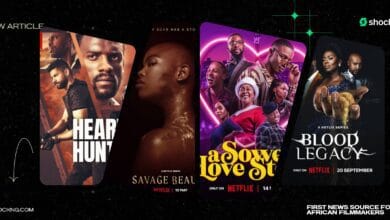The Story ⚡
Movie production in Nollywood is filled with many obstacles, challenges, and breakthroughs. From casting and scripting to promotions, a film producer is tasked with the burden of creating enthralling, capital-intensive films while juggling deadlines, promotions, and location challenges.
Passport, a one-of-a-kind Nigerian comedy, is set to take the big screens in a storm. The movie follows two individuals from different walks of life on their journey to finding each other and a lost passport.
We sit with the film’s executive producer, Vincent Okonkwo, in this interview, as we explore his passion, record of excellence, and a keen eye for details in the making of this ghetto comedy.
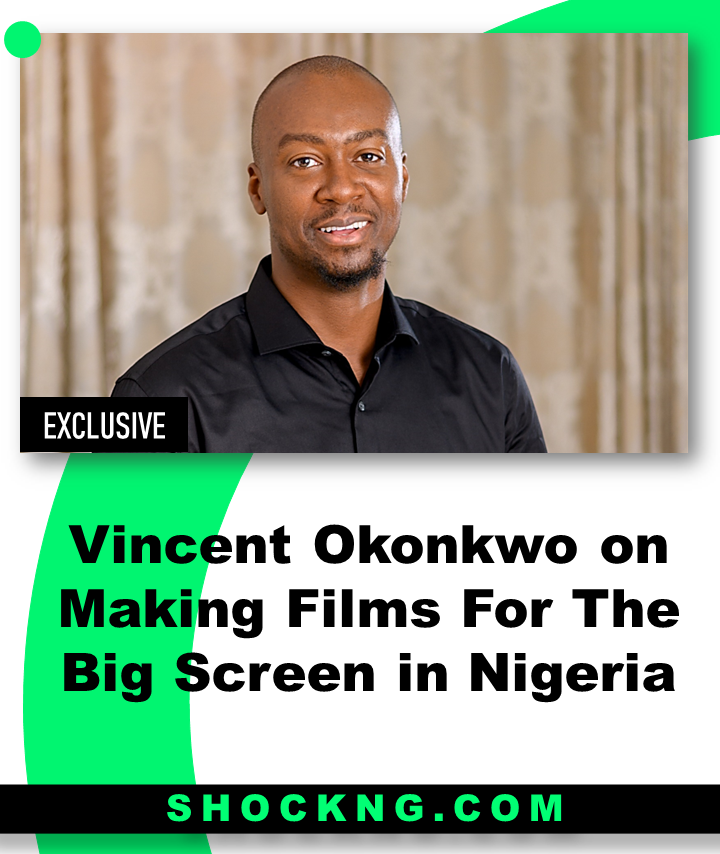
As an executive producer working with different people to make a film, how has that experience been for you?
The first thing is that my first two projects were self-funded. Even for Passport, most of the funding came from me. And that’s because of my passion for movie production and telling good stories. So the experience of working with people, trying to co-produce, is that you have to find the middle ground. Sometimes people may not understand completely what motivates you, but at a point, you need to give room for support; you have to be more flexible and allow your co-producers a significant say. Basically, giving them a sense of belonging.
Can you give us a breakdown of your creative development processes; finding a story, telling it, getting a scriptwriter and director?
Okay, the first thing is that I am always very involved in most of my productions. In all three productions that I’ve done at the box office, I’ve been highly involved in the scriptwriting process. So, I kind of give a direction as to what I think will make it more cinematic and engaging to keep the audience on their feet and relaxed. They are coming to the cinema to relax. So you have to find a middle point between telling your stories and also entertaining the audience. When it’s a bit too serious it becomes a problem.
I think I’ve mastered the art of promotion. When we promote, we are putting out materials that we believe will captivate the audience and get them to anticipate the film. These things are very important. Sometimes, we see really good movies with subpar teasers and promotional materials. So, I’m actively involved in everything, even up to poster creation.
People believe you need many years of experience in this business, but I’ll say I’m a fast learner. I have a background in business outside Nollywood and I always believe that it’s important to find a balance between passion and profits. If you are passionate, you also have to ask yourself, “what can I do to make the numbers? How do I make sure that I have a good return on investment? How do I limit expenditure?” Those are the reasons why I’m involved in all the processes.
I would say confidently that I am one of the best cast directors at the moment. I do my casting by myself. When I read a script, I envisage the character and I know the most suitable cast to use. This is because I know what I want to interpret, so I make it a priority to get the cast. Sometimes failure in a movie is due to bad character interpretation which then tells on the return on investment.
So I believe we have mastered the art of promotions. With what we’ve done with Passport, it’s been a consistent flow of captivating materials and nice engaging teasers. We work based on our market and we know what appeals to the market, and that’s what we’ve done.
What’s the distribution process like for your films? Are your distributors carried along from inception or after the product is done?
Okay, so these are two things. Because I’m confident and I’ve mastered the market, my distributors would be more confident in allowing me to decide which content will be favorable for the market. So I understand the thinking of my distributor because they are looking for commercially viable content and star powers that will sell. Irrespective, a good story is not good enough to sell itself at the box office. We say that it’s also important that you remember that the Nigerian market is geared towards patronizing some particular cast. So when you give them what they want, you solve your problem halfway.
You don’t need to get them involved except if they are co-producing with you. If they are not co-producing, the onus is on you to find a midpoint and give them something that is commercially viable. What I can do is give them an idea of what I want to work on but the decision still lies with me because, at the end of the day, their activity is to distribute; they distribute what you give them. I think some producers believe that the success of a movie relies on how distributors position the movie, but I’m against that idea. I believe it’s up to you as a producer to give them the confidence to position your movie in a way whereby it’s a win-win for everyone.
That brings me back to promotion. If you don’t do your job and your homework well and you want your distributor to go all out for your film, then you’re not being fair, because these distributors are business people, and cinema time is precious time. It encourages your distributor and other chains of distributors that are listed on the Nigerian Cinema Exhibitors list to be confident and to anticipate.
I believe once these distributors are not financially invested in your project, it is on you to promote your film. Understanding what your distributor wants is also paramount. If you don’t understand what they want, it doesn’t matter how many times you go to them, you will not be satisfied with the advice they give you. I remember attending the last AFRIFF and Funke Akindele made a statement on not ignoring the advantage of having star powers in the box office hits.
If we’re being honest, we know that there’s no box office hit that does not have super-casting. If you look at movies that have made hits, they all have premium actors. So it’s not on the distributors, but on you as a filmmaker to know your budget on casting. For me, I don’t rely on my distributors. I do what I have to do.
Speaking on promotions, what medium would you say has brought you great results?
Well, I feel that all of them (radio, TV, billboards, and social media ads) are important and they complement each other. Promotions should complement themselves. Let me give you an example. You see a lovely car and it catches your attention, but you don’t know what the specifications are. Or you see a billboard with a new car and you drive past it, you like it, but you don’t know what the specifications are, you don’t know what it looks like inside.
What happens is you see a billboard or ads on the digital marketplace which are clips, and these clips basically give you information about the car. This way, the two mediums complement each other because the human mind is always processing a lot of things. You see something in a flash and it goes.
You see it repeatedly, then it sticks in your mind and brings up a curiosity. So it is why both of them (billboard and digital) are extremely important. You also need to be able to properly interpret your story so it shows in your promotions. They all complement each other; no medium is more important than the other.
Let’s talk about Passport from conception to production
The first thing is that Passport was supposed to be directed by someone else, but they had other engagements and had to hand it over. When the idea came, there were a lot of synopses. I looked at them and initially said I was not interested. I had second thoughts and went back to read through the synopses again, that was when I saw the potential in the film. I decided to take on the movie and was heavily involved in the writing.
During the scripting, I argued that men were not the only ones who were touts, there were also some women in the game. So we made Kopiko’s sibling a woman. That’s how we came about Mighty. Like I told you, I kind of followed the writing step by step, and then we have a finished product that is awesome. I didn’t just leave it to chance.
I put a lot of things into consideration, most especially the audience; how can I get this money out of their pockets? I remember when we just did Wildflower, people said it would not make even 20 million naira because it’s a rape story and all that. So I was intentional from my casting up through my promotion. I have done more promotions for Passport because we are a bit more confident about the title, and we have more engaging material to cut from.
Wildflower was a bit too serious, so we couldn’t cut too much without giving it away, but we were able to find a midpoint and we got a 40 million naira mark. As I said, understanding what the market wants is the key to everything. And then again, you must build your story to be able to accommodate who you are selling it to.
What was the green light you saw that propelled you to start shooting the film?
We had paid the cast, paid for the location, the crew members were ready, and we were very intentional and very prompt. Mercy Johnson and Jim Iyke specifically needed a bit of assurance that we were going to film at the right time. I knew it was a big deal for me to bring those two heavyweights to the same screen. So it was a priority for us to make sure that we worked with the timelines because they have other engagements, and God willing, we were able to achieve it within the period of time we allocated.
How many days did you shoot for, and was Lagos the only location used?
We shot for 11 days and it was in Lagos. The whole story in the film happened in a day.
In terms of casting heavyweights like Mercy Johnson and Jim Iyke, why was it important that they both feature in the film?
As I said, I’m a good cast director. I read my story, then approached it intentionally. So if I see that a cast will interpret a particular story better, I make it a priority to get the person. When we saw Kopiko’s character, all I could see was a Dumebi, a Mercy Johnson. I knew that no other person would play the character like her. For Jim Iyke, I believe if you’re going to cast a Kopiko, you need someone as mature as she. We were also looking for a premium cast.
These heavyweights have been out of the big screens for a while, then Jim Iyke did his back comments and single-handedly promoted the movie and made over 60 million naira, so one could only imagine if you teamed him up with a few other people and the right story. He was extremely supportive. So it’s a good one.
As a production company in the Nollywood business, how have you been able to navigate investments and revenue generation?
Movie production is not a get-rich-quick scheme. You need to have that at the back of your mind. It has to be passion driven with patience, then the profit will come. So far, we have not lost, but we tied down money because Ponzi was not a loss. For WildFlower, we are expecting to get offers, and Passport is an investment. We have to be patient to see what God has to offer us at the box office.
Hopefully, we make back our capital there and do not need to wait for ancillary to come to our rescue. So it’s important to have patience and passion. We are hoping that at some point the ancillaries will see us and reward our hard work with original content projects that we know we are capable of delivering exceptionally on if given the opportunity. So we will keep pushing.
We have another project coming up, it’s already cast, and as usual, we go all out with our casting. We have a date slotted for the last week of October, where we will get going in the production proper. We are at the pre-production stage and the locations are costing a lot because we are stepping up. We’re doing private jet scenes so it’s going to cost us, but we want to do more so that VSL Media can be a brand to look up to. We want people to be confident in the fact that VSL Media doesn’t disappoint on movies we put out.
In recent times we’ve seen executive producers go to film school and then direct. Is that something you’re considering?
Well, it’s not a bad one, but I think I’m in my premature state. We sometimes forget that even in Hollywood there are departments people don’t just jump into because people are doing it. Before trying your luck on a new path like directing, you need to ask yourself, “where is my strength?”
I believe I carry the position of a producer because from casting, and scripting to crew selection, I excel at it. So I don’t want to fill up my head and overwhelm myself. I could consider it in the near future. Personally, I would love to be in my corner and not be in a hurry to switch to directing because there’s a lot of money involved. Most times it’s me funding my project, so if I start a project and then decide to direct it, it’s a risk that will fail. You have to leave people to have input based on their experience.
If you want to learn directing, you have to learn with the minimum risk of smaller-budget movies, but at the end of the day, it’s all about choice. Personally, I feel that it’s premature for me to do that and there’s really no rush.
It’s best if you pay someone to do a good job for you. Sometimes you want a certain expression; you want the actor to be sober, but there’s a difference between being sober and upset. There’s a difference between being angry and disappointed. You may not know the difference, and this will tell on your character interpretation. All these are things a director will look out for and correct, and it comes with experience. For now, I am just sticking to producing.
Do you think box office films have affected sales on the big screen?
Yes, it has affected, but there’s still a fraction of the audience that wants to have a feel of the cinema because of the culture. It’s a relaxation spot, an outing spot. People look forward to seeing a movie on weekends because it’s fun, it’s a hobby. There are people that look forward to these things.
What should people be looking out for in Passport?
They should look out for proper character interpretation; the cast at their best. Everybody brought their A-game. The story is very interesting and hilarious, there’s no dull moment in Passport. It’s well-shot. The cinematography was spot on. The grading was amazing. It will be the best Nigerian comedy so far. Mercy is one in a million, and she brought her A-game.
How were you able to work with Zubby Michael?
Zubby featured in my first project; he fits the character. I have a personal relationship with him. He respects and likes me, and I respect and like him too. We at VSL Media don’t joke with the Zubby Michael brand. We’ve worked hand-in-hand since his Omo Ghetto days. We have done more jobs with him for the big screens than any other production company in recent times. We will take a risk on Zubby any day any time because he is an amazing actor and a team player. A Zubby on your production gives you added value and credibility. He does what you expect him to do, and he will promote a movie he believes in. So he’s a good one.
What do you think Nollywood should be doing right now to put our best foot forward and go global like Afrobeats?
Okay. I think we should collaborate more, share ideas and compete healthily. Competition should not bring about envy if we see an opportunity to bring more people to get to the top of the ancillary chain. If you feel they are worthy and hardworking, encourage and connect them, because that’s the only reason why music is ahead of us. There’s so much jaunting in Nollywood and people spend time jaunting than actually focusing on building themselves. It’s important that we have an open mind and understand that the sky is big enough for all to fly.
